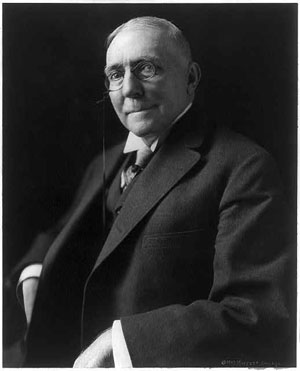A Dream of Autumn
James Whitcomb Riley
Mellow hazes, lowly trailing
Over wood and meadow, veiling
Somber skies, with wildfowl sailing
Sailor-like to foreign lands;
And the north-wind overleaping
Summer's brink, and floodlike sweeping
Wrecks of roses where the weeping
Willows wring their helpless hands.
Flared, like Titan torches flinging
Flakes of flame and embers, springing
From the vale the trees stand swinging
In the moaning atmosphere;
While in dead'ning-lands the lowing
Of the cattle, sadder growing,
Fills the sense to overflowing
With the sorrow of the year.
Sorrowfully, yet the sweeter
Sings the brook in rippled meter
Under boughs that lithely teeter
Lorn birds, answering from the shores
Through the viny, shady-shiny
Interspaces, shot with tiny
Flying motes that fleck the winy
Wave-engraven sycamores.
Fields of ragged stubble, wrangled
With rank weeds, and shocks of tangled
Corn, with crests like rent plumes dangled
Over Harvest's battle-piain;
And the sudden whir and whistle
Of the quail that, like a missile,
Whizzes over thorn and thistle,
And, a missile, drops again.
Muffled voices, hid in thickets
Where the redbird stops to stick its
Ruddy beak betwixt the pickets
Of the truant's rustic trap;
And the sound of laughter ringing
Where, within the wild-vine swinging,
Climb Bacchante's schoolmates, flinging
Purple clusters in her lap.
Rich as wine, the sunset flashes
Round the tilted world, and dashes
Up the sloping west and splashes
Red foam over sky and sea--
Till my dream of Autumn, paling
In the splendor all-prevailing,
Like a sallow leaf goes sailing
Down the silence solemnly.
This is another of James Whitcomb Riley's poems which evoke his native Indiana landscape. The Hoosier poet's work is inextricably linked with the countryside, people and culture of Indiana.
